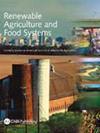In search of a sustainable alternative for meat production: understanding the purchase intention of meat from transhumance origin
IF 2
3区 农林科学
Q2 AGRICULTURE, MULTIDISCIPLINARY
引用次数: 0
Abstract
Abstract In recent years, meat production and consumption has become a topic of intense debate for environmental, animal welfare and health reasons. Research on more sustainable alternatives to meat production has increased. Our goal is to gain insight into the purchase of meat from transhumance livestock and to explore the main factors driving this process. This type of meat is more respectful towards the environment and animal welfare, provides financial stability for many rural families and helps preserve an activity that is part of the cultural heritage in rural areas. From a methodological point of view, we have adopted the theoretical alphabet theory model proposed by Zepeda and Deal in 2009 to explain sustainable purchase behavior. For this purpose, we created two different models, one for lamb meat and one for beef meat. The data come from an online survey of Spanish meat consumers. We applied a structural equation modeling technique to test the suggested model and hypothesis. The results allow us to conclude that the alphabet theory is a suitable theory for our data. The level of knowledge on transhumance and contextual factors, such as the content of fat or the type of meat, impact the creation of attitudes towards this type of livestock farming, but demographic variables do not. In both models, buying meat with a designation of origin and buying meat at specialty retailers are habits that positively influence purchase intention. Our results are highly relevant to help meat of transhumant origin reach the markets and to differentiate it from other products.寻找可持续的肉类生产替代品:了解跨人类来源肉类的购买意图
近年来,由于环境、动物福利和健康的原因,肉类生产和消费已经成为一个激烈争论的话题。对更可持续的肉类生产替代品的研究已经增加。我们的目标是深入了解从转牧牲畜那里购买肉类的情况,并探索推动这一过程的主要因素。这种肉更尊重环境和动物福利,为许多农村家庭提供了经济稳定,并有助于保护作为农村文化遗产一部分的一项活动。从方法论的角度来看,我们采用了Zepeda和Deal在2009年提出的理论字母表理论模型来解释可持续购买行为。为此,我们创建了两个不同的模型,一个用于羊肉,一个用于牛肉。这些数据来自一项针对西班牙肉类消费者的在线调查。我们应用结构方程建模技术来检验建议的模型和假设。结果使我们得出结论,字母表理论是一个适合我们数据的理论。关于畜牧业的知识水平和环境因素,如脂肪含量或肉类类型,会影响人们对这类畜牧业的态度,但人口变量不会。在这两种模式中,购买带有原产地标识的肉类和在专业零售商购买肉类都是积极影响购买意愿的习惯。我们的研究结果与帮助肉类进入市场并将其与其他产品区分开来高度相关。
本文章由计算机程序翻译,如有差异,请以英文原文为准。
求助全文
约1分钟内获得全文
求助全文
来源期刊

Renewable Agriculture and Food Systems
农林科学-农业综合
CiteScore
5.20
自引率
7.40%
发文量
39
审稿时长
>36 weeks
期刊介绍:
Renewable Agriculture and Food Systems (formerly American Journal of Alternative Agriculture) is a multi-disciplinary journal which focuses on the science that underpins economically, environmentally, and socially sustainable approaches to agriculture and food production. The journal publishes original research and review articles on the economic, ecological, and environmental impacts of agriculture; the effective use of renewable resources and biodiversity in agro-ecosystems; and the technological and sociological implications of sustainable food systems. It also contains a discussion forum, which presents lively discussions on new and provocative topics.
 求助内容:
求助内容: 应助结果提醒方式:
应助结果提醒方式:


